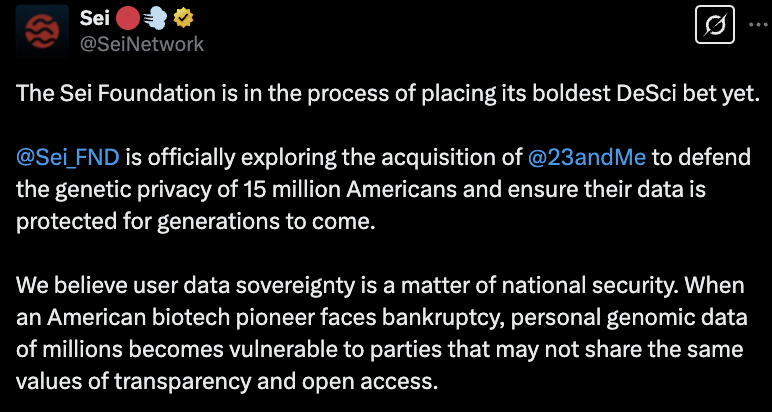The foundation behind the layer-1 blockchain, Sei, has revealed its interest in acquiring the genetic testing firm 23andMe, which recently declared bankruptcy.
In a post on March 27, the Sei network stated it was considering the purchase of 23andMe “to safeguard the genetic privacy of 15 million Americans” by integrating the company’s data onto the blockchain. The foundation indicated that, upon acquisition, it intended to deploy all genetic data on the blockchain and “restore data ownership to users through secure, anonymous transfers.”

March 27 post announcing a possible acquisition of 23andMe.
“We hold the belief that user data sovereignty is a key issue of national security,” said the Sei network. “When a pioneering American biotech company finds itself in bankruptcy, the personal genomic information of millions becomes susceptible to entities that might not uphold the same standards of transparency and equitable access.”
This announcement followed closely—around four days—after 23andMe disclosed its filing for Chapter 11 protection in the US Bankruptcy Court for the Eastern District of Missouri. At that time, the company assured that there would be “no changes to the way [it] stores, manages, or protects customer data,” which reportedly encompasses genetic information from approximately 15 million individuals worldwide.
Related: Experts caution against freely sharing your DNA data with 23andMe.
The bankruptcy of 23andMe has reignited worries regarding data privacy in an era when corporations hold vast amounts of genetic information from millions of individuals.
Following the bankruptcy announcement, attorneys general from New York and California urged 23andMe users to reach out and request the deletion of their personal data, emphasizing their right to privacy and the destruction of any DNA samples. They pointed out that state laws granted users control over their own data.
The value of the network’s Sei (SEI) token saw a brief uptick, rising from $0.209 to $0.215 following the network’s post — representing an approximate increase of 3%.
Magazine: Longevity expert predicts AI will aid in achieving ‘biological immortality’ by 2030.
